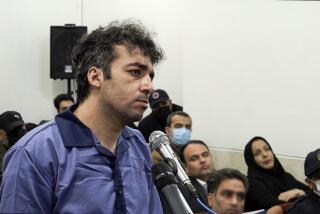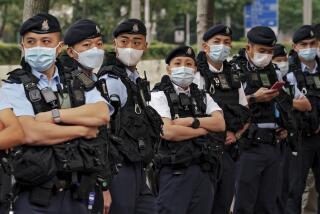Turkey Puts Kurd Leaders on Trial Despite Rights Critics : Courts: The six defendants are ex-lawmakers. They are not accused of violence, but may face death sentences.
- Share via
ISTANBUL, Turkey — Six elected ethnic Kurd leaders went on trial Wednesday for alleged political crimes, despite mounting American and Western criticism of Turkey’s human rights record.
Turkish warplanes simultaneously bombed a suspected Turkish Kurd rebel camp in northern Iraq, an attack almost certainly timed to show the armed forces’ determination to pursue the military solution they favor to crush a 10-year-old Kurdish revolt.
Troops killed 13 Kurdish rebels in the previous 24-hour period, piling up bodies in the bloodiest year yet of a conflict that has killed an estimated 12,400 guerrillas, troops and civilians since 1984.
Turkey now deploys almost 300,000 soldiers, police and militia in mainly Kurdish southeastern Turkey to stamp out an estimated 10,000 rebel militants.
Turkish officials claim more than 2,250 guerrillas have been “captured dead” this year and boast that their “kill rates” are better than those of U.S.-backed forces in Vietnam. But some foreign diplomats worry that Turkish officials’ obsession with a military victory may drag Turkey into a Vietnam-style quagmire. U.S. officials visiting Turkey over the past year have stressed the need for some kind of political solution.
Despite Turkey’s membership in the North Atlantic Treaty Organization and strategic position close to Russia, the Balkans, the Caucasus and the Middle East, Washington has also begun to express similar sentiments. Some in Congress have even proposed to partly link a 10% reduction in Turkey’s proposed $364 million in U.S. military aid to improvements in Ankara’s human rights record.
“I assess the situation (of Turkey’s human rights record) as being a matter of concern and importance,” U.S. Secretary of State Warren Christopher told the House Foreign Affairs Committee in a hearing last week. “I’ve never felt that the solution to those internal security problems was advanced by violations of human rights.”
The start of what promises to be a long trial in Ankara of six ethnic Kurd leaders was typical of Turkey’s outdated laws and its narrow approach to the problems of its 12 million Kurds, about one in five of the Turkish population, diplomats following the trial said.
The six suspects were all elected to the Turkish Parliament in 1991, riding a wave of state promises on human rights and ethnic reforms. But those hopes quickly faded.
All six were stripped of their parliamentary immunity and jailed five months ago. The five who were members of the Kurdish nationalist Democracy Party were expelled from Parliament, as were six other deputies who fled to Europe.
On Wednesday, the state prosecutor called for the death penalty for all six as he started to read a 452-page indictment. The six are accused of speaking out for Kurdish political rights and accepting directives from an outlawed, Syrian-based Kurdish rebel leader.
Although some have voiced sympathy for the rebels or have relatives in rebel ranks, none of the suspects are accused of any act of violence themselves.
“Who is judging whom? This is like the Spanish Inquisition in the Middle Ages” screamed the front page of the Istanbul-based Kurdish nationalist daily Ozgur Ulke (Free Country). It published a full page of what it called a “countersuit” in the name of 43 of the most prominent ethnic Kurd politicians and activists slain in the past three years.
The “countersuit” detailed the Kurdish nationalist case, alleging that Turkey had: unfairly suppressed the Kurds’ ethnic identity for the 71-year history of the republic, emptied and largely destroyed 1,500 villages since 1984, denied Kurds the right to a Kurdish education, operated holding camps and bombed seven Democracy Party buildings this year.
Foreign pressure has brought some promises of reforms from Turkish Prime Minister Tansu Ciller. But more noticeable has been a shift toward nationalist populism on both sides since the death last year of Turkish leader Turgut Ozal, who lifted a ban on the Kurdish language in 1991.
Some things have changed, however. Public and television debate of the Kurdish question is more open than ever. And not all Turkish Kurds agree with the radical Stalinist ideology of the rebels, who are labeled as terrorists both by the United States and some European states.
More to Read
Sign up for Essential California
The most important California stories and recommendations in your inbox every morning.
You may occasionally receive promotional content from the Los Angeles Times.












